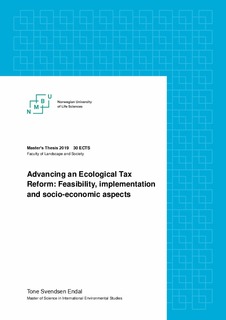| dc.contributor.advisor | Goméz-Baggethun, Erik | |
| dc.contributor.author | Endal, Tone Svendsen | |
| dc.date.accessioned | 2019-09-06T09:40:16Z | |
| dc.date.available | 2019-09-06T09:40:16Z | |
| dc.date.issued | 2019 | |
| dc.identifier.uri | http://hdl.handle.net/11250/2612911 | |
| dc.description.abstract | An Ecological Tax Reform is argued to discourage environmentally harmful activities and to raise revenues that can improve overall welfare. The aim of this thesis is to increase our understanding of the potential to advance more ambitious green tax reforms in the context of the green shift in Norway. Through interviews with key informants, the feasibility and implementation of an Ecological Tax Reform has been scrutinised, along with the socio-economic considerations that needs to be accounted for to advance policies towards an Ecological Tax Reform. This research suggests that a reform is feasible, but key issues need to be determined in terms of implementation, while carefully designing environmental taxes to limit negative distributional effects. Implemented correctly, an Ecological Tax Reform should be a central component of the green shift. | nb_NO |
| dc.language.iso | eng | nb_NO |
| dc.publisher | Norwegian University of Life Sciences, Ås | nb_NO |
| dc.rights | Attribution-NonCommercial-NoDerivatives 4.0 Internasjonal | * |
| dc.rights.uri | http://creativecommons.org/licenses/by-nc-nd/4.0/deed.no | * |
| dc.subject | Environmental taxation | nb_NO |
| dc.subject | Green shift | nb_NO |
| dc.title | Advancing an ecological tax reform : feasibility, implementation and socio-economic aspects | nb_NO |
| dc.type | Master thesis | nb_NO |
| dc.subject.nsi | VDP::Social science: 200 | nb_NO |
| dc.source.pagenumber | 74 | nb_NO |
| dc.description.localcode | M-IES | nb_NO |

